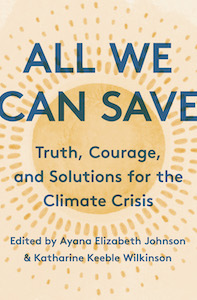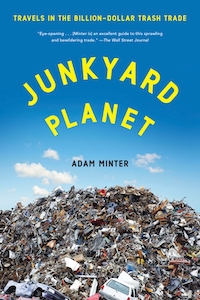Environmentally conscious behavior (in a disposable society that’s warming up the globe every day) is just one more challenge to meet in the already compounding day-to-day demands on our lives. Limited hours in the day, concern over additional expense, and social pressures for conformity all contribute to the internal conflict of adopting a recycled lifestyle.
Yet reading this article indicates an underlying concern or interest in behavioral change and perhaps suggests that you are interested in preserving a quality life for our next generation and those thereafter.
True, the jury is still out on many issues related to recycling, global warming, and renewable resources, but there is no question that taking small steps such as reducing, reusing, and recycling can go a long way in protecting our limited natural resources.
To further inspire and educate, here are six books that share small ways you can make a big difference in saving the planet.
101 Ways to Go Zero Waste by Kathryn Kellogg. It can be overwhelming to think about how to make a difference in your attempts to cut back on waste. Enter Kathryn Kellogg, who can fit all her trash from the past two years into a 16-ounce mason jar. How? She starts by saying “no” to straws and grocery bags, and “yes” to a reusable water bottle and compostable dish scrubbers. “It’s not about perfection,” she says. “It’s about making better choices.” And she shares how you can get started in this practical  and inspiring book of intentional change.
and inspiring book of intentional change.
All We Can Save: Truth, Courage, and Solutions for the Climate Crisis by Ayana Elizabeth Johnson and Katharine K. Wilkinson. It is almost impossible not to be educated to some degree regarding our society’s impact on the environment. Every magazine or newspaper has one or more articles addressing the concerns over our changing planet and how we, as consumers, can make a difference. All We Can Save is both a how-to and an empowerment collective. Containing stories, poetry and art, two climate leaders have embarked on the process of making a difference by helping women take the helm. A compassionate leader may be just what is necessary for a healthier tomorrow, and who better to take us there than women and girls from all walks of life who traditionally do not have a seat at the table. Encouraging a feminist movement toward climate change, the authors share how women can use their voices to step into globally conscious leadership and make a difference. This compelling book has even started a movement: All We Can Save.
Love Earth Now: The Power of Doing One Thing Every Day by Cheryl Leutjen is your go-to guide for discovering what you can do to effect meaningful change, starting right now. Each chapter concludes with a “Love Earth Invitation,” a simple and immediate exercise to prompt you to explore your own feelings and calls to action. These eco-mindfulness moments provide the opportunity to reflect and discover what you can do right now that will mean more to the world than all that power and influence can buy.
Resetting Our Future: Zero Waste Living the 80/20 Way: The Busy  Person’s Guide To A Lighter Footprint by Stephanie J. Miller This book addresses the feeling of powerlessness when it comes to making a difference in an
Person’s Guide To A Lighter Footprint by Stephanie J. Miller This book addresses the feeling of powerlessness when it comes to making a difference in an
overwhelming world filled with waste and climate deterioration. Take recycling. Even armed with an understanding of the knowledge of the benefits of recycling and practicing a sustainable lifestyle, one would wager one of the biggest challenges facing today’s consumer is time and money. After all it takes less time to toss an empty plastic bottle into the trash can than to carry it down the hall to a recycling bin, or in some cases tote it all the way home for curbside. For others time becomes an even bigger issue because they may not have access to office or curbside recycling. The good news is that waste management facilities are making it easier for organizations, schools and businesses to recycle and often spearheading such programs can be a note-worthy project. In Resetting Our Future Stephanie J. Miller combines her career focused on climate change with her own research and personal experience to show how a few, relatively easy lifestyle changes can create significant positive impact. Using the simplicity of the 80/20 rule, she shows us those things (the 20%) that we can do to make the biggest (80%) difference in reversing the climate and waste crises.
Junkyard Planet: Travels in the Billion-Dollar Trash Trade by Adam Minter.  Buckle up for a behind the scenes look at what is really going on with our trash. While you may think that recycled water bottle will show up as a T-shirt on a Bloomingdale rack, think again. Masters of trade and digital wizards are cashing in on our junk. Journalist Adam Minter traces the export of America’s garbage and the massive profits that China and other rising nations earn from it. This stark reality of a 500-billion-dollar industry that’s transforming our economy and environment should make Americans rethink how they manage their trash.
Buckle up for a behind the scenes look at what is really going on with our trash. While you may think that recycled water bottle will show up as a T-shirt on a Bloomingdale rack, think again. Masters of trade and digital wizards are cashing in on our junk. Journalist Adam Minter traces the export of America’s garbage and the massive profits that China and other rising nations earn from it. This stark reality of a 500-billion-dollar industry that’s transforming our economy and environment should make Americans rethink how they manage their trash.
My Friend Earth by Patricia MacLachlan and Francesca Sanna tells the uplifting story of our friend Earth and how many wonderful things she’s doing to care for animals and nature, celebrating the seasons that give life to our planet. Another big reason to educate ourselves on protecting the environment lies with our children. Schools have adopted programs stressing the importance of recycling and caring for our natural resources and it can become an emotional struggle for children to learn about the importance of living an environmentally conscious lifestyle when it is not positively reinforced in the home. Insignificant as it may seem to some, it should become a topic of conversation with your children so that you can better understand their changing value systems and find a balance in your family lifestyle. This book, along with the many other earth-conscious books available today, serves as great learning tools, conversation starters and creative inspiration.
And although learning about the effects of our disposable lifestyle can be eye-opening and even startling, education is the first step to understanding. These six books will help you further along that path and onto a more humanitarian and sustainable life.
Images Courtesy of Random House, John Hunt Publishing and Bloomsbury Press


No comments yet.